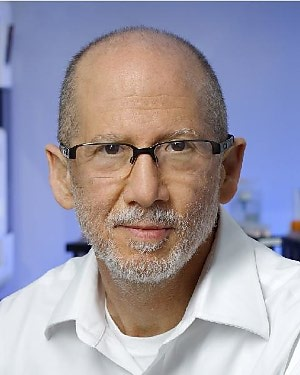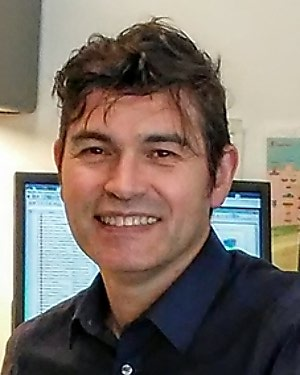Immunotherapy Research Labs
Bert Vogelstein Laboratory
Principal Investigator
Bert Vogelstein, M.D.
The Bert Vogelstein Laboratory seeks to develop new approaches to the prevention or treatment of cancers through a better understanding of the genes and pathways underlying their pathogenesis.
Our major focus is on cancers of the colon and rectum. We have shown that each colon neoplasm arises from a clonal expansion of one transformed cell. This expansion gives rise to a small benign colon tumor (called a polyp or adenoma). This clonal expansion and subsequent growth of the tumors appears to be caused by mutations in oncogenes and tumor suppressor genes, and the whole process is accelerated by defects in genes required for maintaining genetic instability. Mutations in four or five such genes are required for a malignant tumor to form, while fewer mutations suffice for benign tumorigenesis. As the mutations accumulate, the tumors become progressively more dangerous.
Current studies are aimed at the further characterization of the mechanisms through which these genes act, the identification of other genes that play a role in this tumor type, and the application of this knowledge to patient management.

Cynthia Sears Laboratory
Principal Investigator
Cynthia Sears, M.D.
Work in the Cynthia Sears Laboratory focuses on the bacterial contributions to the development of human colon cancer and the impact of the microbiome on other cancers and the therapy of cancer. The current work involves mouse and human studies to define how enterotoxigenic Bacteroides fragilis, pks+ Escherichia coli, Fusobacterium nucleatum, biofilms and the colonic microbiota induce chronic colonic inflammation and colon cancer. Prospective human studies of the microbiome and biofilms in screening colonoscopy are in progress as are studies to determine if and how the microbiome impacts the response of individuals with cancer to immunotherapy and other cancer therapies.

Drew Pardoll Lab
Principal Investigator
Drew Pardoll, M.D., Ph.D.
The Pardoll Lab focuses on the regulation of antigen-specific T cell responses and studies approaches to modify these responses for immunotherapy. Pardoll has a particular interest in cancer immunology and his lab’s studies on basic immunologic mechanisms have led to the development and design of a number of cancer vaccines and discovery of key checkpoint ligands and receptors, such as PD-L2, LAG-3 and neuritin, many of which are being targeted clinically.
Our primary pursuits are discovering and elucidating new molecules that regulate immune responses, investigating the biology of regulatory T cells, and better understanding the specific biochemical signatures that allow a patient’s T cells to selectively target cancer cells.

Drug Discovery Group
Principal Investigator
Barbara Slusher, Ph.D., M.A.S.
Barbara Slusher, M.A.S., Ph.D., leads a 20-member veteran drug discovery team of medicinal chemists, assay developers, pharmacologists, toxicologists and pharmacokinetic/drug metabolism experts, who identify novel drug targets arising from JHU faculty’s research and translate them into new, small molecule drug therapies.
Her team collaborates extensively with faculty at the Bloomberg~Kimmel Institute for Cancer Immunotherapy and leads the BKI immunotherapy drug discovery core, aimed at developing new immune-targeting drug therapies for laboratory and clinical testing at Johns Hopkins.

Elisseeff Lab
Principal Investigator
Jennifer Elisseeff, Ph.D.
The mission of the Elisseeff Lab is to engineer technologies to repair lost tissues. We aim to bridge academic research and technology discovery to treat patients and address clinically relevant challenges related to tissue engineering. To accomplish this goal we are developing and enabling materials, studying biomaterial structure-function relationships and investigating mechanisms of tissue development to practically rebuild tissues. The general approach of tissue engineering is to place cells on a biomaterial scaffold that is designed to provide the appropriate signals to promote tissue development and ultimately restore normal tissue function in vivo. Understanding mechanisms of cellular interactions (both cell-cell and cell-material) and tissue development on scaffolds is critical to advancement of the field, particularly in applications employing stem cells. Translation of technologies to tissue-specific sites and diseased environments is key to better design, understanding, and ultimately efficacy of tissue repair strategies. We desire to translate clinically practical strategies, in the form of biomaterials/medical devices, to guide and enhance the body's natural capacity for repair. To accomplish the interdisciplinary challenge of regenerative medicine research, we maintain a synergistic balance of basic and applied/translational research.

Elizabeth M. Jaffee, M.D.
Principal Investigator
Elizabeth Jaffee, M.D.
Current projects include:
The evaluation of mechanisms of immune tolerance to cancer in mouse models of breast and pancreatic cancer. We have characterized the HER-2/neu transgenic mouse model of spontaneous mammary tumors.
This model demonstrates immune tolerance to the HER-2/neu gene product. This model is being used to better understand the mechanisms of tolerance to tumor. In addition, this model is being used to develop vaccine strategies that can overcome this tolerance and induce immunity potent enough to prevent and treat naturally developing tumors. More recently, we are using a genetic model of pancreatic cancer developed to understand the early inflammatory changes that promote cancer development.
The identification of human tumor antigens recognized by T cells. We are using a novel functional genetic approach developed in our laboratory. Human tumor specific T cells from vaccinated patients are used to identify immune relevant antigens that are chosen based on an initial genomic screen of overexpressed gene products. Several candidate targets have been identified and the prevalence of vaccine induced immunity has been assessed.
This rapid screen to identify relevant antigenic targets will allow us to begin to dissect the mechanisms of tumor immunity induction and downregulation at the molecular level in cancer patients. More recently, we are using proteomics to identify proteins involved in pancreatic cancer development. We recently identified Annexin A2 as a molecule involved in metastases.
The analysis of antitumor immune responses in patients enrolled on vaccine studies. The focus is on breast and pancreatic cancers. We are attempting to identify in vitro correlates of in vivo antitumor immunity induced by vaccine strategies developed in the laboratory and currently under study in the clinics.

Franck Housseau Lab
Principal Investigator
Franck Housseau, Ph.D.
The Franck Housseau Lab focuses on the role of the microbiome in colorectal tumorigenesis and on developing a better understanding of the tumor immune microenvironment. The lab is currently working to define the biomarkers of a pre-existing antitumor immune response in metastatic colorectal cancer to define a population of patients eligible for checkpoint blockade therapies.

Kenneth W. Kinzler Laboratory
Principal Investigator
Kenneth Kinzler, Ph.D.
Dr. Kinzler’s laboratory has focused on the genetics of human cancer. They have identified a variety of genetic mutations that underlie cancer, including mutations of the APC pathway that appear to initiate the majority of colorectal cancers and IDH1/2 mutations that underlying many gliomas. In addition, they have developed a variety of powerful tools for analysis of expression and genetic alterations in cancer.
Most recently, they have pioneered integrated whole genome analyses of human cancers through expression, copy number, and mutational analyses of all the coding genes in several human cancer types including colorectal, breast, pancreatic and brain. The identification of genetic differences between normal and tumor tissues provide new therapeutic targets, new opportunities for the early diagnosis of cancer, and important insights into the neoplastic process.

Lei Zheng Lab
Principal Investigator
Lei Zheng, M.D., Ph.D.
Zheng’s research focuses on two R01-funded projects; first, the group has developed a pancreatic cancer immunotherapy research program on a neoadjuvant therapy platform as well as a number of preclinical models of pancreatic cancer for developing innovative immunotherapy strategies. The group has applied the knowledge gained from pancreatic cancer immune-based therapies to the development of a colorectal cancer GVAX vaccine. Second, the group is aimed at understanding the mechanistic roles of the tumor microenvironment in cancer development and metastasis and identifying new targets for pancreatic cancer therapies by dissecting the tumor microenvironment of pancreatic cancer.

Robert Anders Lab
Principal Investigator
Robert Anders, M.D., Ph.D.
Dr. Anders’ laboratory focuses on the basic processes that lead to cancer. His team approaches these questions through the use of both experimental models and examination of human tissues. His team is specifically interested in interrogating the immune microenvironment of cancer, detecting circulating cancer cells and preventing cancer metastasis.

Suzanne Topalian Lab
Principal Investigator
Suzanne Topalian, M.D.
Our lab currently focuses on three areas of immunotherapy research: gaining a deeper knowledge of the biological underpinnings of human autoimmune response; discovering biomarkers that will help us identify which patients and tumor types are most likely to respond to various immune therapies; and developing immune-based treatment combinations that could deliver a more powerful anti-tumor response than monotherapies.

Victor Velculescu Lab
Principal Investigator
Victor Velculescu, M.D., Ph.D.
The lab currently focuses on identifying genetic alterations in cancer affecting sensitivity and resistance to targeted therapies, and connecting such changes to key clinical characteristics and novel therapeutic approaches. We have recently developed methods that allow noninvasive characterization of cancer, including the PARE method that provided the first whole genome analysis of tumor DNA in the circulation of cancer patients. These analyses provide a window into real-time genomic analyses of cancer patients and provide new avenues for personalized diagnostic and therapeutic intervention.

